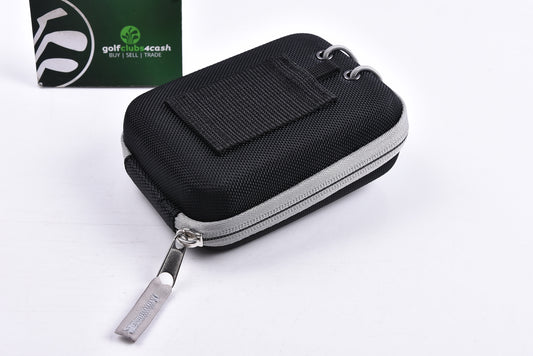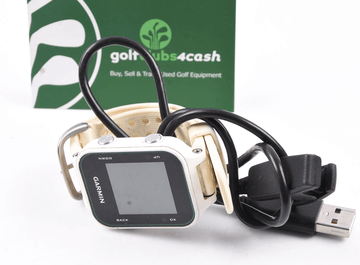If you’re anything more than the most casual player that’s happy playing a round of golf without focusing too much on performance, then sooner or later you’ll be tempted to explore how technology can aid your game.
It used to be the case that only professional players were lucky enough to benefit from the extra yardage intelligence that their caddy would be able to give them, and other than that golfers just relied on the odd yardage stamped on a post or signpost on the golf course.
These days we have a lot more technology at our fingertips, and it can bring about vast improvements in your game if you know how to use it to your advantage correctly.
But as is the case with all technology, golf rangefinders and golf GPS devices (Global Positioning System) are not all created equal, and it’s difficult to decide which gadget would best suit your needs, along with deciding what functionality you need from your device.
In order to decide on the best rangefinder or GPS device to suit you, you need to understand what you will mainly be needing its help for. In this golf buying guide, we’ll take you through the most important things to know about golf GPS devices and rangefinders and help you decide on which type is best suited to your needs.
First, let’s cover the legalities…


The ultimate guide to buying a second hand golf rangefinder or GPS device
ARE GOLF RANGEFINDERS AND GPS DEVICES ALLOWED?
The truth is that, while technique and ability can get you so far, there’s nothing like adding in a little extra insight to boost the precision and accuracy of your shots and lower your handicap. You may wonder if rangefinders and GPS devices are allowed in golf, and the answer is yes - with some caveats.
According to the R&A website, ‘distance and directional’ aids are allowed to measure distance and direction, but not elevation changes. So it’s absolutely fine to buy a second hand rangefinder or GPS device and use it in your game, as long as you adhere to the usage rules. Please note though that some local clubs may have their own rules too, so make sure you check with them before you head out on your round.
Let’s dig in a little to find out about the different features and benefits of golf rangefinders and GPS devices.
Looking for a new Rangefinder? Browse our latest stock below.


Laser Rangefinder Carry Case / Compatible with Bushnell, Callaway


Shot Scope Pro LX (1st Gen) Laser Rangefinder / Case Included


Shot Scope Pro LX (2nd Gen) Laser Rangefinder / Case Included


Garmin Approach G8 / GPS


Bushnell Tour V5 Laser / Rangefinder


Garmin Approach S60 / GPS Watch


Flightscope Mevo / Launch Monitor


Bushnell Pro XE / Rangefinder
GOLF RANGEFINDERS
If you’re interested in the accuracy of your approach shots over anything else, then it’s a rangefinder that you need. These handy little devices are able to calculate distance to within a yard, and sometimes they can be even more precise than that. Rangefinders have transformed the way golfers can navigate a course that they don’t know and haven’t played before.
The main thing you need to know about golf rangefinders is that they are built using the same laser technology as rifle scopes for the military and hunting, and so in order for them to work you need to be able to see the pin that you are aiming for. But that also gives you a good indication of just how accurate they can be!

For a slight premium, the upper end of the golf rangefinder models will also be able to give you insight on the slope too, so you’ll be able to know whether your shot needs to take into account whether you’re playing uphill or downhill and if so what impact that will have on the shot length that you need to take.
Bear in mind that there are rules preventing you from obtaining slope/elevation insight when you’re playing official competitions under British golf rules. If you’re buying a rangefinder it’s worth checking that you have the ability to turn this function off the particular model you’re looking at if you want to use it to play in official tournaments.
They can be used anywhere, with no need to make sure that you’ve always got the latest software downloaded in advance, and you can also use them to good effect on driving ranges too when you’re practising that all-important golf swing.
The downsides of golf rangefinders
There aren’t many disadvantages to carrying a golf rangefinder with you, but some people say that they can find it difficult to get an accurate reading if their hands are shaking. It might also slow your game down a little as you dig it out of your bag and calculate your distance.
The only other downside to golf rangefinders as we mentioned above is that if you can’t see the pin then they’ll serve very little purpose for that shot. And if there’s an obstruction in the way such as a tree or a hill then you’ll probably find that it won’t work as well as you’d like it to more softly. So it’s great for accuracy too.

Golf rangefinders in summary
Overall, we think that having a golf rangefinder to hand is a great gadget to have up your sleeve. It may not help you with every shot, but it will give you the insight and accuracy you need for a majority of shots you take in any game, perhaps giving you that extra edge of confidence to play a great shot. You should be prepared to still have to play the odd blind shot, but in most cases, it’s simply a matter of point, click, and play.
Check out our range of used golf rangefinders or download our app - we constantly update our stock levels so keep checking back to be the first to spot the newest bargains to hit our shelves.
GOLF GPS DEVICES
Golf GPS devices don’t just help you on the course though, they also monitor other statistics such as how many steps you’ve taken, how many calories you’re burning as you play and even what your heart rate is doing at any given time on or off the course. So they’re popular with people who enjoy getting a full overview of their activity and health, as well as the golfing insights that they need too. And of course, they can be worn all the time - not just while you’re playing golf.
A basic GPS device will tell you essential information such as how far you are from the front, back and middle of the green (often referred to as front-middle-back watches). The more sophisticated models will be able to give you varying degrees of full-hole imagery from tee to green, and ways of finding the exact distance to trees, bunkers, water or other obstacles.
Some golfers prefer to use a handheld GPS as opposed to a watch, because they can see everything on a larger screen. This is especially true for some senior golfers with reduced eyesight and who may struggle to focus on a small watch screen.
View our latest accessories

Masters Winter Mat


Scotty Cameron Circle T Stripe Golf Tees / Black, Gold & Tiffany


Golfclubs4cash Branded Bamboo Tees (pack of 50)


Swing Speed Golf Speed Sticks / Training Aid


Scotty Cameron Tool Set / Wrench, 15g, 15g, 15g, 15g, 20g, 20g Included


Scotty Cameron Circle T Putting Path Tool Training Aid / Blue / Pair


Scotty Cameron Circle T Putting Path Tool Training Aid / Gold / Pair


Adams DiXX Digital Instructor Putter / Training Aid / 34 Inch
Can I have a golf GPS device app on my smartphone?
You can download a few different smartphone apps that will give you average GPS functionality at a low cost, but most players find that this is not enough and instead they invest in a watch or handheld device. In some cases with the free versions you only get access to a few courses and the imagery is not very up to date.
Some people don’t like to take their phone on a round of golf with them, enjoying the peace and quiet from a temporary absence of notifications and phone calls. In addition to this, smartphones are notoriously bad at retaining battery power especially when GPS functions are active. So for many reasons, it’s best not to rely on smartphone apps for GPS insight.
The downsides of golf GPS devices
Whether it’s a handheld device or a wearable GPS wristwatch, there aren't many downsides to golf GPS devices and they are becoming more and more popular with amateur and professional golfers alike. However, a drawback is that unlike the rangefinder they won’t give you any intelligence on slope, so if that’s something you’d like to factor in then a rangefinder might be the better choice for you.
Golf GPS devices can sometimes let you down on accuracy, and the yardage can sometimes be out, so if this is an issue for you then again we’d recommend the rangefinder instead.
Finally, GPS devices only contain the relevant and accurate information and imagery if a course has been mapped recently. Most courses have been mapped but there is still the odd one where there is either no information at all, or the course has undergone some changes which are not yet reflected in the GPS intelligence.
Golf GPS devices in summary
In a nutshell, the main advantage of a GPS device over a rangefinder is that the GPS gives you far more insight and features along with a full view of the course, but if slope is a consideration to you then a rangefinder is probably a better option.
We’re always adding to our second hand handheld and wristwatch GPS golf devices at golfclubs4cash - check out our current range and be sure to check back regularly to be the first to spot new items that we have on offer.
CAN I USE A GOLF RANGEFINDER AND A GPS?
Yes! You don’t have to stick to just one solution; you can carry both with you so you’re prepared for every eventuality. A lot of regular golfers use their basic GPS watch or device on a course they know well, saving the rangefinder for when they’re playing a course that they’ve not played before. And some even use both at the same time - although bear in mind that extra time it will add onto your round if you’re consulting two devices on every shot.
If you’re still not sure whether you’d prefer a rangefinder or a GPS device to help you in your game, give us a call and we’ll help talk you through your options. If you’re local to our golf store in Edinburgh or Warrington then you can benefit from our 14-day no-quibble trial by taking the device out on the course and giving it a run for its money.
WHICH BRANDS MAKE THE BEST RANGEFINDERS AND GPS DEVICES?
There are plenty of leading brands that offer golf rangefinders and GPS devices, and our advice would always be to check the reviews before buying. Bushnell are known for their top-quality rangefinders, and Garmin make excellent handheld and smartwatch GPS devices. GolfBuddy and Volvik are other leading names in the GPS and rangefinder market.
If you’re in any doubt as to the quality of the rangefinder or GPS model you’re looking at, let us know. And when you buy second hand golf GPS devices and rangefinders from golfclubs4cash you can do so safe in the knowledge that we have a full and comprehensive returns policy. So in the unlikely event that after trying it out, you feel that it’s not the right device for you, make the most of our returns service.

















































